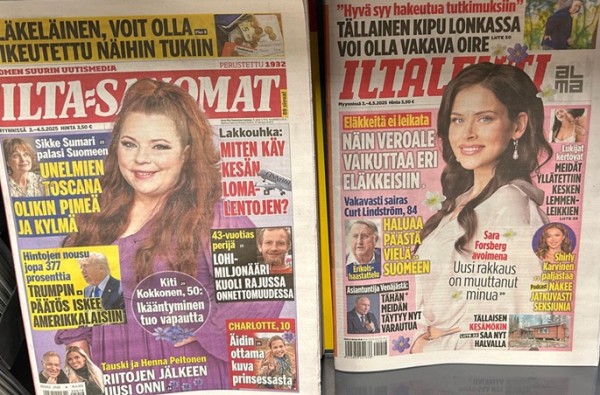
Finland ranked fifth for the fourth consecutive year in the 2025 World Press Freedom Index published by Reporters Without Borders (RSF) on Friday.
In 2022, Finland´s rank slipped to fifth from second. Finland ranked second for three consecutive years in 2019, 2020 and 2021.
Norway has topped the 2025 index for the fifth consecutive year followed by Estonia, Netherlands and Sweden.
Eretria has ended up at the bottom of the list of 180 countries, followed by North Korea, China, Syria, Iran and Afghanistan.
The RSF in its report said that the media are free in Finland, where the first law prohibiting censorship was adopted under Swedish rule in 1766.
However, lawsuits against journalists and a court ruling undermining their legal protection have created a climate of uncertainty in the profession.
The government that came to power in 2023 is pursuing a public broadcasting reform which will lead to significant budgetary cuts.
Press freedom enjoys strong constitutional guarantees and only a limited number of legal sanctions can be imposed in cases of defamation, extreme hate speech or high treason. The confidentiality of sources is protected by law.
However, the 2023 conviction of two reporters on charges of revealing state secrets and a court ruling that imposes taxes on journalists for legal defense provided by their employer has deterred journalists from covering national security issues.
Journalists can suffer psychological stress as a result of harassment on social media and SLAPP (Strategic Lawsuits Against Public Participation) lawsuits to which the legal system has yet to respond appropriately.
Freelance journalists are especially vulnerable, and a support fund created by the Union of Journalists in Finland may compensate for loss of income, pay for psychotherapy and cover other expenses that result from stress related to journalistic work, the report added.
The RSF in its global report said that although physical attacks against journalists are the most visible violations of press freedom, economic pressure is also a major, more insidious problem.
“When news media are financially strained, they are drawn into a race to attract audiences at the expense of quality reporting, and can fall prey to the oligarchs and public authorities who seek to exploit them. When journalists are impoverished, they no longer have the means to resist the enemies of the press — those who champion disinformation and propaganda. The media economy must urgently be restored to a state that is conducive to journalism and ensures the production of reliable information, which is inherently costly,” said RSF editorial director Anne Bocandé.
Source: www.dailyfinland.fi


